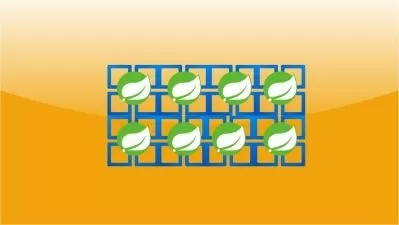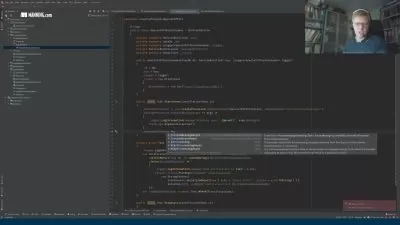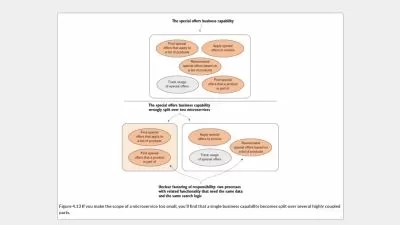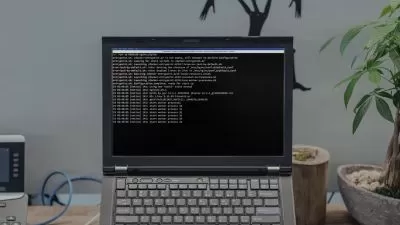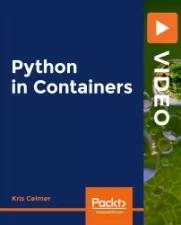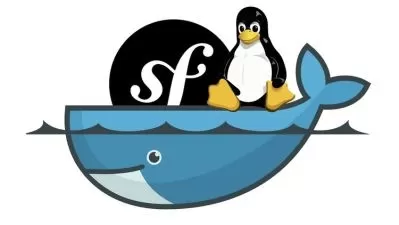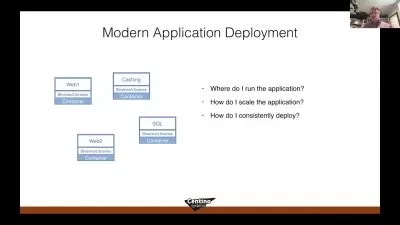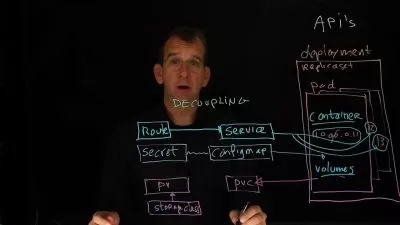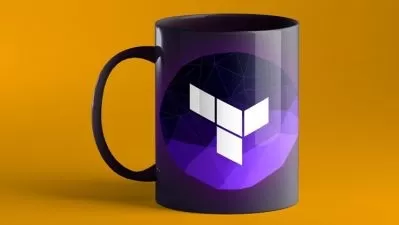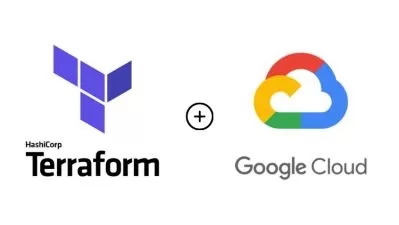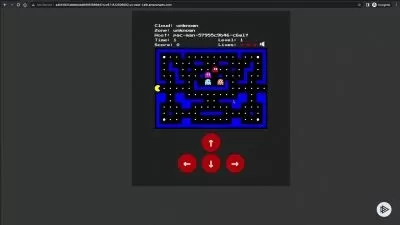Bootstrapping Microservices with Docker, Kubernetes, and Terraform, video edition
Focused View
12:18:10
25 View
01-Chapter 1 Why microservices.mp4
08:07
02-Chapter 1 What will I learn.mp4
07:58
03-Chapter 1 What is a microservices application.mp4
10:30
04-Chapter 1 Benefits of microservices.mp4
08:52
05-Chapter 1 Modern tooling for microservices.mp4
11:47
06-Chapter 2 Creating your first microservice.mp4
09:40
07-Chapter 2 Our philosophy of development.mp4
07:44
08-Chapter 2 Establishing our single-service development environment.mp4
09:19
09-Chapter 2 Building an HTTP server for video streaming.mp4
06:22
10-Chapter 2 Installing Express.mp4
08:23
11-Chapter 2 Running our simple web server.mp4
09:25
12-Chapter 2 Setting up for production.mp4
12:58
13-Chapter 3 Publishing your first microservice.mp4
06:47
14-Chapter 3 Why Docker.mp4
06:42
15-Chapter 3 Packaging our microservice.mp4
10:41
16-Chapter 3 Booting our microservice in a container.mp4
06:38
17-Chapter 3 Publishing our microservice.mp4
12:15
18-Chapter 3 Booting our microservice from the registry.mp4
09:06
19-Chapter 4 Data management for microservices.mp4
09:11
20-Chapter 4 Creating our Docker Compose file.mp4
09:51
21-Chapter 4 Working with the application.mp4
09:05
22-Chapter 4 Adding file storage to our application.mp4
08:24
23-Chapter 4 Using Azure Storage.mp4
11:08
24-Chapter 4 Testing the updated application.mp4
09:02
25-Chapter 4 Adding a database to our application.mp4
12:37
26-Chapter 4 Adding a database server in production.mp4
09:21
27-Chapter 5 Communication between microservices.mp4
07:07
28-Chapter 5 Live reload for fast iterations.mp4
11:23
29-Chapter 5 Updating the Docker Compose file for live reload.mp4
11:47
30-Chapter 5 Methods of communication for microservices.mp4
08:28
31-Chapter 5 Sending a message with HTTP POST.mp4
07:06
32-Chapter 5 Indirect messaging with RabbitMQ.mp4
08:13
33-Chapter 5 Connecting our microservice to the message queue.mp4
08:26
34-Chapter 5 Multiple-recipient messages.mp4
07:42
35-Chapter 5 What have we achieved.mp4
05:35
36-Chapter 6 Creating your production environment.mp4
11:30
37-Chapter 6 Working with the Azure CLI.mp4
06:18
38-Chapter 6 Creating infrastructure with Terraform.mp4
07:30
39-Chapter 6 Creating an Azure resource group for your application.mp4
10:56
40-Chapter 6 Building your infrastructure.mp4
11:00
41-Chapter 6 Creating your container registry.mp4
08:15
42-Chapter 6 Creating our Kubernetes cluster.mp4
07:42
43-Chapter 6 Interacting with Kubernetes.mp4
05:11
44-Chapter 6 The Kubernetes CLI.mp4
08:11
45-Chapter 7 Getting to continuous delivery.mp4
07:06
46-Chapter 7 Deploying containers with Terraform.mp4
11:54
47-Chapter 7 Deploying our first microservice with Terraform.mp4
09:08
48-Chapter 7 Continuous delivery with Bitbucket Pipelines.mp4
12:05
49-Chapter 7 The Bitbucket Pipelines script.mp4
12:16
50-Chapter 8 Automated testing for microservices.mp4
11:52
51-Chapter 8 Testing with Jest.mp4
10:54
52-Chapter 8 Interpreting test failures.mp4
11:58
53-Chapter 8 Unit testing.mp4
10:05
54-Chapter 8 Integration testing.mp4
07:09
55-Chapter 8 Creating an integration test with Jest.mp4
06:05
56-Chapter 8 End-to-end testing.mp4
12:13
57-Chapter 8 Booting your application.mp4
09:16
58-Chapter 8 Automated testing in the CD pipeline.mp4
05:49
59-Chapter 9 Exploring FlixTube.mp4
08:02
60-Chapter 9 Running FlixTube in development.mp4
09:09
61-Chapter 9 FlixTube deep dive.mp4
11:35
62-Chapter 9 The user interface (UI).mp4
10:39
63-Chapter 9 Manually deploying FlixTube to production with Terraform.mp4
11:56
64-Chapter 9 Continuous delivery to production.mp4
07:41
65-Chapter 9 Adding automated testing.mp4
07:12
66-Chapter 10 Healthy microservices.mp4
08:09
67-Chapter 10 Error handling.mp4
07:26
68-Chapter 10 Basic logging with Kubernetes.mp4
10:16
69-Chapter 10 Automatic restarts with Kubernetes health checks.mp4
07:57
70-Chapter 10 Debugging microservices.mp4
07:04
71-Chapter 10 The debugging process.mp4
08:28
72-Chapter 10 Reliability and recovery.mp4
09:58
73-Chapter 10 Simple techniques for fault tolerance.mp4
10:52
74-Chapter 11 Pathways to scalability.mp4
07:50
75-Chapter 11 Independent microservices.mp4
10:30
76-Chapter 11 The meta-repo.mp4
10:04
77-Chapter 11 Scaling performance.mp4
08:42
78-Chapter 11 Elastic scaling for an individual microservice.mp4
06:20
79-Chapter 11 Security.mp4
06:47
80-Chapter 11 Refactoring to microservices.mp4
10:34
81-Chapter 11 Microservices on a budget.mp4
08:56
More details
User Reviews
Rating
average 0
Focused display
Category

O'Reilly
View courses O'ReillyO'Reilly Media is an American learning company established by Tim O'Reilly that publishes books, produces tech conferences, and provides an online learning platform. Its distinctive brand features a woodcut of an animal on many of its book covers.
- language english
- Training sessions 81
- duration 12:18:10
- Release Date 2023/11/06





